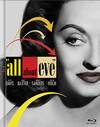





Mrs. Miniver (1942)
Cast | Crew | Awards | Articles | Dialogue | Bibliography | Downloads | Links | Image Credits
| Article 2 |
'Mrs. Miniver,' Excellent Picture of England at War, Opens at the Music Hallby Bosley CrowtherThe New York Times June 5, 1942 page 23It's hard to believe that a picture could be made within the heat of present strife which would clearly, but without a cry for vengeance, crystallize the cruel effect of total war upon a civilized people. Yet that is what has been magnificently done in Metro's "Mrs. Miniver," which came to the Music Hall yesterday. Perhaps it is too soon to call this one of the greatest motion pictures ever made; perhaps its tremendous impact is too largely conditioned by one's own immediate association of one's torn heart with the people so heroically involved. But certainly it is the finest film yet made about the present war, and a most exalting tribute to the British, who have taken it so gallantly. For it is not a war film about soldiers in uniform. There are no bloody land battles in it; no armies clash by night, except for the unseen armadas which drone in the moonlit sky. This is a film about the people in a small, unpretentious English town on whom the war creeps up slowly, disturbing their tranquil ways of life, then suddenly bursts in devastating fury as the bombs rain down and the Battle of Britain is on. This is a film of modern warfare in which civilians become the front-line fighters and the ingrained courage of the people becomes the nation's most vital strength. This is a film in which a flower show is as pregnant of national spirit as Dunkerque. Only the title and leading characters -- and some of the rural charm, it is true -- have been taken from Jan Struther's sketches of pre-war English life. For the story itself tells entirely of the Miniver family after the war begins -- of the lovely and gentle Mrs. Miniver, of her tall and whimsical husband, Clem, of the three charming children -- Vin, the Oxford student, and Judy and Toby, the tots. And it tells of proud old Lady Beldon and her gracious granddaughter, Carol, who falls in love with Vin very naturally, and of Mr. Ballard, the station-master who grows the rose which he names for Mrs. Miniver, and of Foley, the air raid warden and greengrocer. It tells of all these good people and many more in the town of Belham. It tells about Vin joining the air force and later marrying Carol; about Clem being wakened in the night to take his motor launch down the Thames and then on across to Dunkerque to help save the British Army. It tells how Mrs. Miniver catches a German flier who has been brought down and how she reads Toby to sleep with "Alice in Wonderland" in an Anderson shelter on a bomb-filled night, "remembering her own child life and the happy Summer days." It tells of the Beldon flower show and of how Mr. Ballard wins the prize. But, above all, it tells most eloquently of the humor and courage of these people under fire. And the climax is a shattering revelation that it is they, as well as the soldiers, who fight this war. One cannot speak highly enough of the superb understatement and restraint exercised throughout this picture. The four writers who prepared the script have given it a natural, literate quality which matches the very best work in their craft and have admirably blended light and humor with pathos and tragedy. And William Wyler has directed with a sensitivity that rarely shows in films. Every episode is made a full experience, with rich and vibrant overtones. The pulse of real humanity beats strong throughout the film. Greer Garson's performance as Mrs. Miniver glows with compassion and womanly strength. Her encounter with the German flier conveys as fine an emotional conflict as you'll ever see -- on the screen, anyhow; Walter Pidgeon is a real inspiration to masculine stamina and resources as Clem. And Dame May Whitty, Teresa Wright, Henry Travers, Richard Ney and every one in the cast -- not forgetting the youngsters, Christopher Severn and Clare Sandars -- are excellent. Two years ago yesterday Winston Churchill gave his memorable address: "We shall go on to the end. . . We shall never surrender." It was most propitious that "Mrs. Miniver" should open on that anniversary. One seeing it can understand why there was no doubt in Mr. Churchill's mind. © 1942 The New York Times |
|
Return to the
Index of Articles. |
| Now in Print! |
|---|
| Now on DVD! |
|---|
Buy Videos & DVDs |
|
Buy Movie Posters |
|
Buy Movie Posters |
|
Classic
Movie Merchandise |
|
![]() Printer-friendly version.
Printer-friendly version.
![]() Return
to the top.
Return
to the top.
Last updated:
March 10, 2011.
Reel Classics is a registered trademark of Reel Classics, L.L.C.
© 1997-2011 Reel Classics, L.L.C. All rights reserved. No
copyright is claimed on non-original or licensed material.
Terms of
Use.









